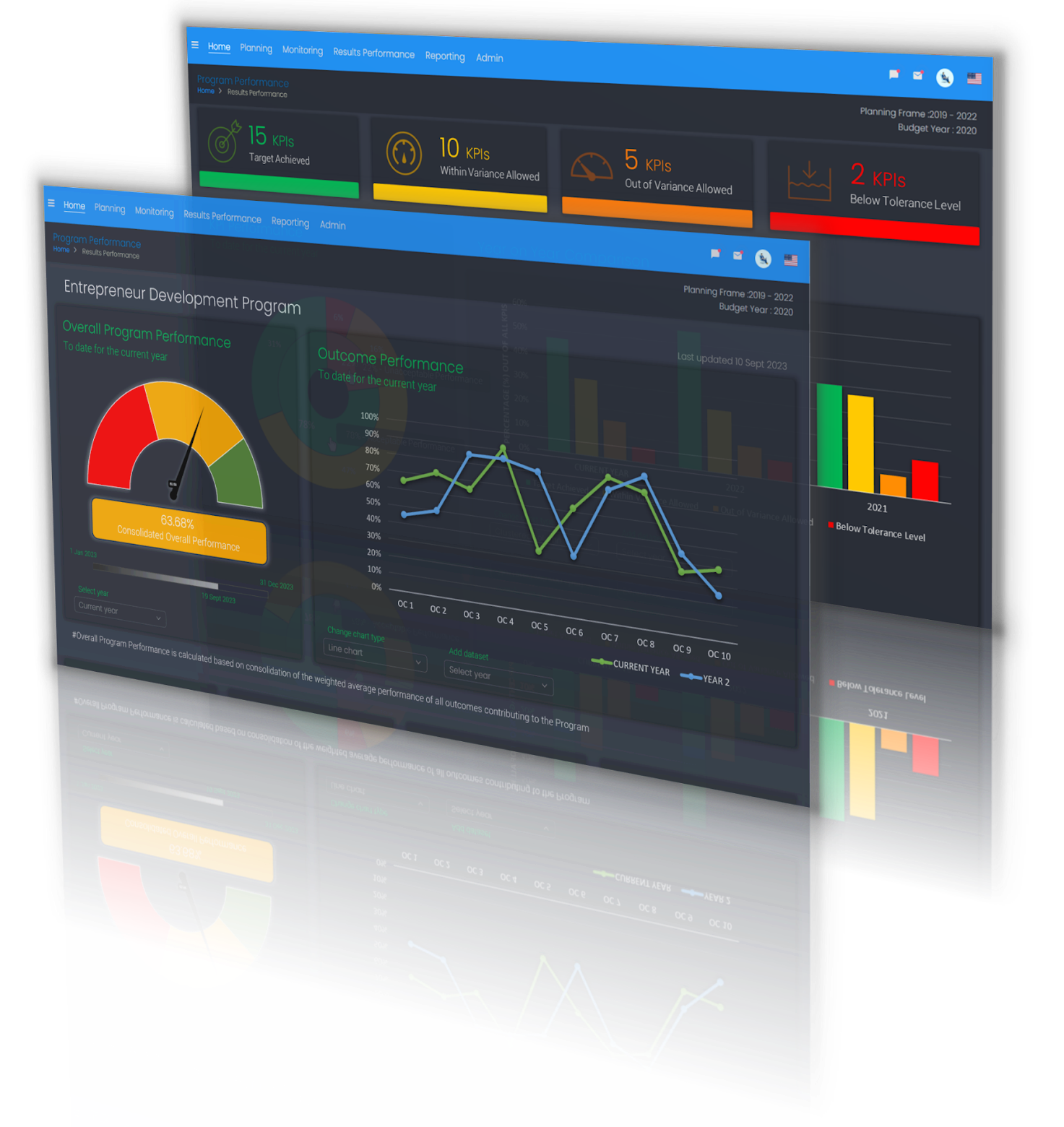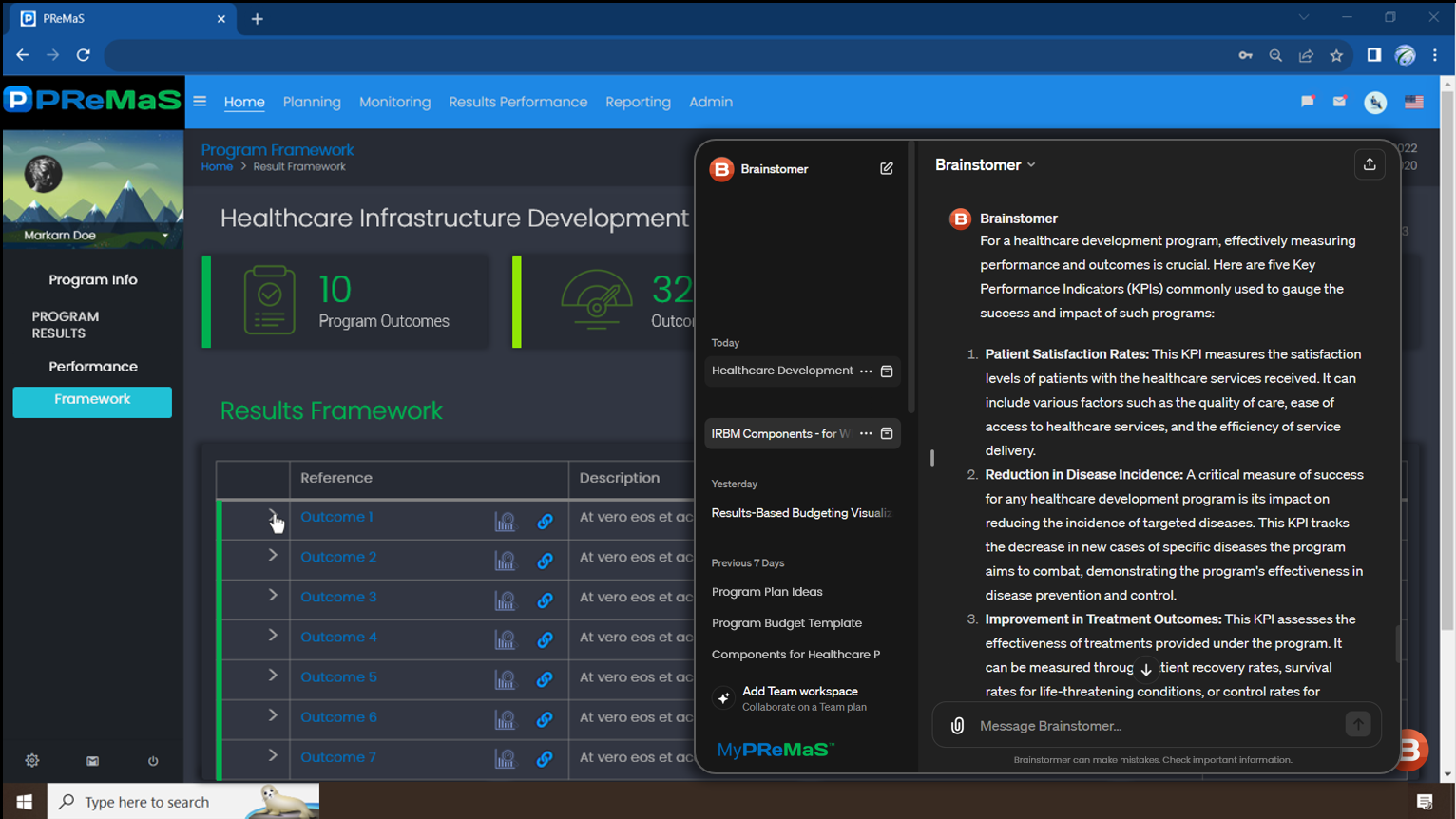The Performance & Results Management Solution



Intelligent Decision Support with PReMaS
PReMaS provides accurate and reliable information for a better management system for decision making. The solution allows for analysis of relationships between different components and levels to achieve desired results.
Brainstorm and analyze ideas and solutions with BrainStormer the custom GPT AI chat tool built right into the application.

Comprehensive Management Tools to Unlock Superior Performance and Results
Strategic Performance Planning
Ensure seamless alignment with sector and national priorities, fully compliant with the Integrated RBM system.
Our module simplifies your strategic planning, connecting each phase to concrete results for unmatched organizational coherence.
Performance Monitoring
This integral tool ensures real-time, ground-level data entry for accurate performance tracking, laying the groundwork for insightful performance reporting.
Results-Based Budgeting
Maximize every dollar for optimal organizational impact, ensuring your funding proposals meet the critical demand for results-oriented approaches.
It's the ultimate tool for harmonizing your financial resources with strategic objectives, effortlessly.
Performance Monitoring
Equip your leadership with executive dashboards for a panoramic view of outcomes, ensuring RBM compliance and demonstrating impact with unmatched clarity.
Elevate transparency and drive results with precision.
- Integrated Development Planning
- Results-Based Budgeting
- Monitoring & Evaluation
- Personnel Performance System
- Management Information & Decision Support System
Integrated Development Planning
Integrated Development Planning (IDP) within the Integrated Results-Based Management (IRBM) system is a core component focused on aligning development efforts with national priorities to achieve sustainable growth and development. IDP involves a strategic planning process that outlines medium-term development initiatives, typically over five-year periods, underpinned by annual development plans that are further broken down quarterly for effective monitoring and evaluation.
Read More
The process of IDP includes:
- Reviewing and confirming the macro development results framework, ensuring it is comprehensive and aligned with national development goals.
- Identifying national priorities and strategic key result areas (SKRA) for each priority area, along with the expected outcomes.
- Forming Thematic Working Groups (TWGs) consisting of relevant stakeholders from the public sector and development partners to foster a collaborative and integrated approach to planning.
IDP serves at both the strategic level, providing a blueprint for national development, and the operational level, guiding the performance plans of implementing organizations. This ensures that all development activities are synchronized with national objectives, facilitating a cohesive and focused effort towards achieving targeted results.
Results-Based Budgeting
Results-Based Budgeting (RBB) is an essential component of the Integrated Results-Based Management (IRBM) model. It serves as a strategic management tool designed to enhance resource management and public sector accountability. The fundamental principle of RBB lies in its detailed focus on achieving performance outcomes and its significant linkages with policy-making and resource allocation processes.
Read More
It emphasizes the importance of the results derived from program operations and activities conducted, recognizing the intricate relationship between input utilization, output performance, and the achievement of desired outcomes. This relationship underscores the need for careful consideration of the results achieved at various stages and levels, including input application, activity completion, output delivery, and outcome realization.
RBB operates within a framework that closely integrates budgeting with other functions such as planning and monitoring and evaluation (M&E), underscoring the dynamic interdependence between these functions. A program’s budget is developed and framed based on a strategic results framework that outlines the expected outcomes, with the allocation of resources each year informed by evidence of performance and achievements under the program. This approach facilitates timely, accurate, and reliable resource allocation decisions, addressing traditional issues of allocative efficiency by ensuring that budget and budgetary decisions are closely linked with both the management information system (MIS) and decision-support systems (DSS).
At its core, RBB embodies the IRBM system’s integration principle, applying it across all five components of the IRBM model. This integration ensures a cohesive approach to each function at every stage of the budgeting and planning process, thereby enhancing the overall effectiveness of public sector management and governance.
Monitoring & Evaluation
Results-Based Monitoring & Evaluation (M&E) is a crucial component of the Integrated Results-Based Management (IRBM) system, focusing on the shift from traditional monitoring and evaluation practices, which often centered around inputs and activities, towards an outcomes-driven approach. This shift emphasizes the importance of assessing the actual outcomes and impacts of programs and projects rather than just the resources allocated or activities undertaken.
Read More
Key Aspects of M&E include:
Monitoring: This involves the systematic collection of data about changes, progress, and performance related to specific aspects of a program or project. It’s a continuous process that helps stakeholders understand whether a program is on track toward achieving its intended results.
Evaluation: This is the systematic assessment of a program’s performance, designed to assist stakeholders in making informed decisions about the program’s continuation, scaling, or modification. Evaluation seeks to understand why certain results were or were not achieved and uses data from monitoring as well as other relevant sources.
The M&E approach is characterized by its focus on results such as outputs, outcomes, and impacts. It goes beyond monitoring the execution of activities to evaluating the effectiveness and efficiency of those activities in achieving desired results. RBM&E supports evidence-based decision-making, enhances accountability and transparency, and plays a pivotal role in learning and adaptive management within organizations and programs.
Benefits of M&E:
- Improved Performance Management: By focusing on outcomes and impacts, organizations can better manage their performance towards achieving strategic goals.
- Evidence-based Decision Making: Decisions are made based on data and information that reflect actual performance against expected results.
- Enhanced Accountability: RBM&E provides a basis for holding individuals and entities accountable for achieving agreed-upon results.
- Strategic Learning: Organizations can learn from successes and failures, adjust strategies and interventions, and improve future performance.
RBM&E is most valuable when it is fully integrated into the planning and implementation processes of programs and projects, ensuring that monitoring and evaluation are not afterthoughts but integral parts of achieving strategic objectives.
Personnel Performance System
The Personnel Performance System (PPS) is a critical element of the Integrated Results-Based Management (IRBM) framework, focusing on the strategic use and management of human resources to achieve desired program and organizational outcomes. It aligns individual and team performance with broader organizational goals, ensuring a systematic approach to personnel management and appraisal based on tangible results rather than merely on activities or workload.
Read More
Key aspects of PPS include:
- Integration with Other IRBM Components: PPS is harmoniously integrated with results-based budgeting, planning, monitoring, and evaluation systems, ensuring a unified approach to achieving strategic objectives.
- Performance Agreements: These agreements define the expectations and responsibilities of both management and employees, setting clear objectives and measurable results that align with the organization’s strategic goals.
- Performance Appraisal: A structured process that evaluates individual and team performance against agreed-upon objectives and outcomes. This appraisal focuses on achieving results that contribute to the organization’s strategic goals.
- Enhanced Accountability: PPS promotes accountability by ensuring that individuals and teams are responsible for achieving specific, measurable outcomes. This system encourages a culture of transparency and responsibility throughout the organization.
- Development and Training: PPS identifies areas for professional development and training, aligning them with organizational needs and individual performance improvement plans. This aspect ensures that employees are equipped with the necessary skills and knowledge to meet their performance targets.
- Feedback Mechanisms: Regular feedback is an integral part of PPS, providing employees with information on their performance and guidance on how to improve. This feedback is crucial for personal development and organizational growth.
- E-enabled Systems: The use of electronic systems in PPS facilitates efficient data management, analysis, and reporting. It ensures that performance information is readily available for decision-making and strategic planning.
PPS underpins the effective and efficient use of human resources in achieving organizational goals, emphasizing the importance of aligning individual performance with strategic objectives. This alignment ensures that the organization’s human capital is leveraged in the most impactful way, contributing to the overall success and sustainability of the organization.
Management Information & Decision Support System
The Management Information System (MIS) and Decision Support System (DSS) constitute the technological framework that underpins the Integrated Results-Based Management (IRBM) system. These systems play a critical role in capturing, processing, and analyzing data to support informed decision-making at various levels of management.
Read More
Management Information System (MIS)
MIS is a structured system designed to provide managers at different levels with information based on the regular operations of an organization. It aids middle management in making decisions to ensure smooth operations in the short to medium term. MIS systems provide highly structured information that allows for the assessment of organizational performance through the systematic collection and analysis of data.
Decision Support System (DSS)
DSS, on the other hand, is a knowledge-based system that supports the decision-making process of senior managers. It is used to analyze existing structured information and enable the projection of potential effects of decisions before they are made. DSS systems are interactive, offering access to databases, analytical tools, and supporting the exchange of information within an organization. They facilitate the creation of knowledge that can be integrated into the organization for better decision-making.
Key Functions and Integrations
- Data Collection and Analysis: Both systems function to aggregate data from various sources, analyze this data, and provide insights that are crucial for making strategic decisions.
- Support for Decision Making: By providing timely, accurate, and relevant information, MIS and DSS enable managers to make evidence-based decisions that align with the organization’s strategic objectives.
- Enhancement of Efficiency and Productivity: These systems improve organizational processes by optimizing the decision-making process, which in turn can lead to increased efficiency and productivity.
Implementation and Operation
- Implementing and sustaining an effective MIS/DSS involves several critical components, including policy and regulatory support, institutional arrangements, a functional setup that includes necessary security measures, standardized ICT infrastructure, and comprehensive backstopping and support mechanisms.
By integrating MIS and DSS within the broader IRBM framework, organizations can effectively manage and use data for strategic planning, monitoring, evaluation, and decision-making processes, thereby enhancing overall performance and achieving desired outcomes.
Unleash the Power of AI
A Custom GPT for Breakthrough IRBM Performance Insights


Discover the future of development planning with our IRBM-focused GPT
Tailored to embrace the complexities of your national context, it offers nuanced strategies and alignment with global standards, ensuring your initiatives drive meaningful impact. Elevate your planning with insights that matter, powered by MyPReMaS.

